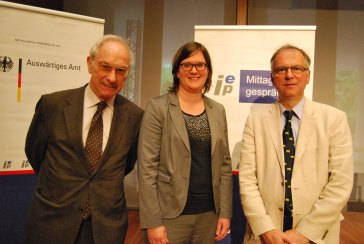IEP Lunch Debate with Prof. Dr. Heribert Hirte, member of the German Bundestag, on “TTIP as a Challenge to the EU Decision-Making System”

In the IEP Lunch Debate at the Representation of Baden-Württemberg to the Federation, Dr Heribert Hirte, member of the German Bundestag, spoke on the topic, “TTIP as a Challenge for the EU Decision-Making System.” The event was opened by Volker Ratzmann, head of the political affairs department at the representation office. Dr Katrin Böttger, deputy director of the Institute for European Politics, moderated the discussion.
In his lecture, Hirte stated that the USA does not feel itself to be culturally and economically tied only to Europe, but will also concentrate on its Pacific sphere as well. For this reason it is important for the EU to rapidly implement a transatlantic free trade agreement with an effective decision-making system. With regard to the current criticism of TTIP and, in particular, of the private arbitration courts, Hirte explained that trade agreements that protect investors using such a legal system are not novelties, but rather have already been common practice in Europe for some time. The heavy criticism, above all in German-speaking Europe, can also be traced back to a latent anti-Americanism, according to Hirte. However, he did agree with critics that the planned arbitration court proceedings would not be sufficiently transparent. In order to increase societal trust in the legal system, more transparency would need to be achieved and hitherto closed court proceedings would increasingly need to be opened to the public. Furthermore, Dr Hirte recommended that Investor-State Dispute Settlements be more strongly interlocked with national courts. In addition, he brought into consideration that small and medium-sized enterprises (SMEs) may require state subsidies to cover the cost-intensive arbitration court proceedings. Through legal subsidies, SMEs, which form the backbone of the German economy, could be substantively supported. Additionally, he emphasized that disputes between American and European companies could only be settled through cross-national institutions, as the national legal systems are not in a position where they can judge neutrally.
In order to counteract the scepticism of many European citizens, it must be determined if the TTIP negotiations will remain the sole prerogative of the EU, or whether they will be negotiated with the cooperation of national governments. This is important, said Hirte, in order to provide clarification to the public. He also emphasized, however, that even if the negotiations were entirely the responsibility of the EU, the agreement would still be sufficiently democratically legitimate because there is enough scope for influence on the proceedings by EU member states.
On several occasions, Dr Hirte emphasized the positive effects of free trade through economies of scale, division of labour, and efficiency gains. Although the reduction of trade barriers would undoubtedly lead to welfare gains and better consumer satisfaction, he said, it is a historic trend that nation states have always tried to counteract the workings of free trade. Dr Hirte indicated that he could completely understand the fears of TTIP leading to a decrease in quality standards, particularly in the food sector. However, he said that there exists a misconception in Germany that American standards are generally below the level of their European counterparts. As it turns out, there are many American product regulations, even in the consumer goods sector, that are significantly more strictly formulated. In general, harmonized standards and increased competition are always in the interest of the consumer, said Hirte.
In the lively discussion which followed, the public was interested above all in how TTIP is perceived in the USA and in what aspects of the free trade agreement were under critique there. Aside from this, it was also asked whether or not this bilateral trade agreement would hinder the efforts of the WTO to promote free trade worldwide. Dr Hirte explained that it is in the interest of all states to decrease trade barriers worldwide, but that it is incredibly difficult to reach a consensus with all members of the WTO within its own frameworks. Bilateral agreements, on the other hand, could be implemented more quickly, simply, and effectively.
By: Bodo von Haumeder and Hunter Hampton


